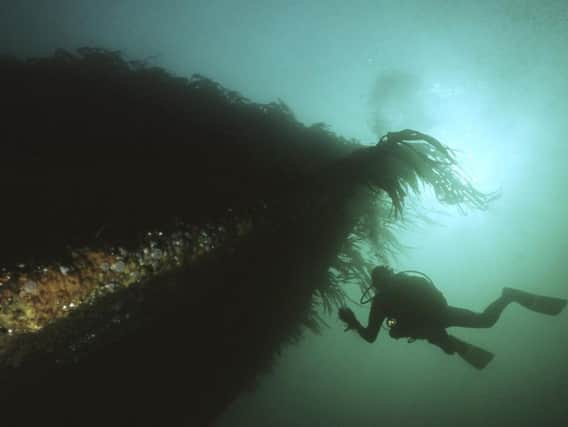Bomb disposal team dealing with Orkney torpedo


The specialists from the Royal Navy were sent to the body of water in Orkney, which served as a major naval base during both world wars. HM Coastguard said the ordnance was found on the seabed during an underwater survey yesterday.
The discovery was made just a day after a series of commemorative events took place at Scapa Flow to mark the centenary of the scuttling of the German High Seas Fleet, which left 833 men killed.
Advertisement
Hide AdAdvertisement
Hide AdOn Friday, divers from the Royal Navy and the German Navy went underwater to lay wreaths at the site, where more than 50 German warships were deliberately sunk by their commander at the end of the Second World War so as to prevent them being divided up amongst Allied forces.
In the wake of the weekend discovery, a military explosives ordnance disposal team was dispatched from Glasgow. The group is expected to carry out an assessment to make the device safe.
An exclusion zone has been set up in the area, with warning signs erected urging people to stay at least 500 metres away from the waters between Hoy and Cava.
Kaimes Beasley, duty controller for HM Coastguard said: "With weather in the area likely to be good, it's more than possible that dive charter boats will want to go there, but our strong advice is to keep away."
Scapa Flow is one of Scotland’s most popular dive sites, thanks to the number of British and German wartime relics lying on the seabed.
It is not the first time that a torpedo has been discovered in the area. Three years ago, Royal Navy bomb disposal experts were sent to detonate an ordinance thought to have been fired at HMS Royal Oak by a German U-boat in 1939. A total of 833 men were killed in the naval disaster.
During the initial detonation, a section of the bomb containing its own explosive charge broke free and appeared on the surface of the water.
However, the Royal Navy team carried out a second controlled explosion to destroy it.
Advertisement
Hide AdAdvertisement
Hide AdThe German High Seas Fleet was interned in Scapa Flow following Armistice in November 1918 while negotiations for the Treaty of Versailles were ongoing.
Rear Admiral Ludwig von Reuter was in command of the 74 vessels - viewed as a threat to the UK's dominance at sea - but had not been informed of a last-minute extension to finalise details of the deal.
He did not want the assets shared among foreign powers without the German government's consent and was struggling with a mutinous, embarrassed and increasingly bored crew.
With the previous deadline for a treaty passed, he issued an order to scuttle the ships.
The admiral was made a prisoner of war but his act of defiance was celebrated in Germany.